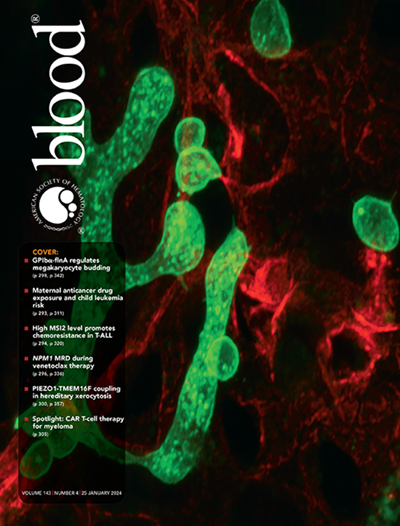Coordinated regulation of self-renewal and cell cycle during human lympho-myeloid lineage restriction.
IF 21
1区 医学
Q1 HEMATOLOGY
引用次数: 0
Abstract
Recent studies indicate the human lympho-myeloid restriction process to be a different and more heterogeneous one than historically inferred. Here we describe the development of bulk and clonal culture systems that efficiently support early B-lymphoid differentiation and its use to elucidate the biological and molecular changes that accompany their initial restriction from subsets of CD34+ human cord blood cells with lympho-myeloid-limited potential. Analyses of these changes revealed that the acquisition of B-lymphoid- and neutrophil/monocyte (NM)-restricted properties are accompanied by a concomitantly accelerated and lineage-shared cell cycling activity and loss of self-renewal potential. Single-cell transcriptome analysis identified reduced expression of multiple self-renewal-associated genes and an accompanying heterogeneous activation of lineage-regulatory modules during the production of B, NM and dendritic cell precursors. By applying a novel culture system that supports early human lymphoid differentiation, we uncover a shared mechanism of proliferation control, along with persistent biological and transcriptional heterogeneity in cells undergoing B and NM lineage restriction.人类淋巴-骨髓系限制过程中自我更新和细胞周期的协调调控。
最近的研究表明,人类淋巴-骨髓限制过程与历史上推断的不同,而且更加异质。在这里,我们描述了可有效支持早期 B 淋巴细胞分化的体细胞和克隆培养系统的开发过程,以及利用该系统阐明了伴随着从具有淋巴-髓系限制潜能的 CD34+ 人类脐带血细胞亚群中初步限制 B 淋巴细胞分化的生物和分子变化。对这些变化的分析表明,B淋巴细胞和中性粒细胞/单核细胞(NM)受限特性的获得伴随着细胞周期活动的加速和品系共享以及自我更新潜力的丧失。单细胞转录组分析发现,在 B 细胞、NM 细胞和树突状细胞前体的产生过程中,多个自我更新相关基因的表达减少,并伴随着系谱调控模块的异质性激活。通过应用支持人类早期淋巴细胞分化的新型培养系统,我们发现了一种共享的增殖控制机制,以及在经历 B 和 NM 系限制的细胞中持续存在的生物学和转录异质性。
本文章由计算机程序翻译,如有差异,请以英文原文为准。
求助全文
约1分钟内获得全文
求助全文
来源期刊

Blood
医学-血液学
CiteScore
23.60
自引率
3.90%
发文量
955
审稿时长
1 months
期刊介绍:
Blood, the official journal of the American Society of Hematology, published online and in print, provides an international forum for the publication of original articles describing basic laboratory, translational, and clinical investigations in hematology. Primary research articles will be published under the following scientific categories: Clinical Trials and Observations; Gene Therapy; Hematopoiesis and Stem Cells; Immunobiology and Immunotherapy scope; Myeloid Neoplasia; Lymphoid Neoplasia; Phagocytes, Granulocytes and Myelopoiesis; Platelets and Thrombopoiesis; Red Cells, Iron and Erythropoiesis; Thrombosis and Hemostasis; Transfusion Medicine; Transplantation; and Vascular Biology. Papers can be listed under more than one category as appropriate.
 求助内容:
求助内容: 应助结果提醒方式:
应助结果提醒方式:


